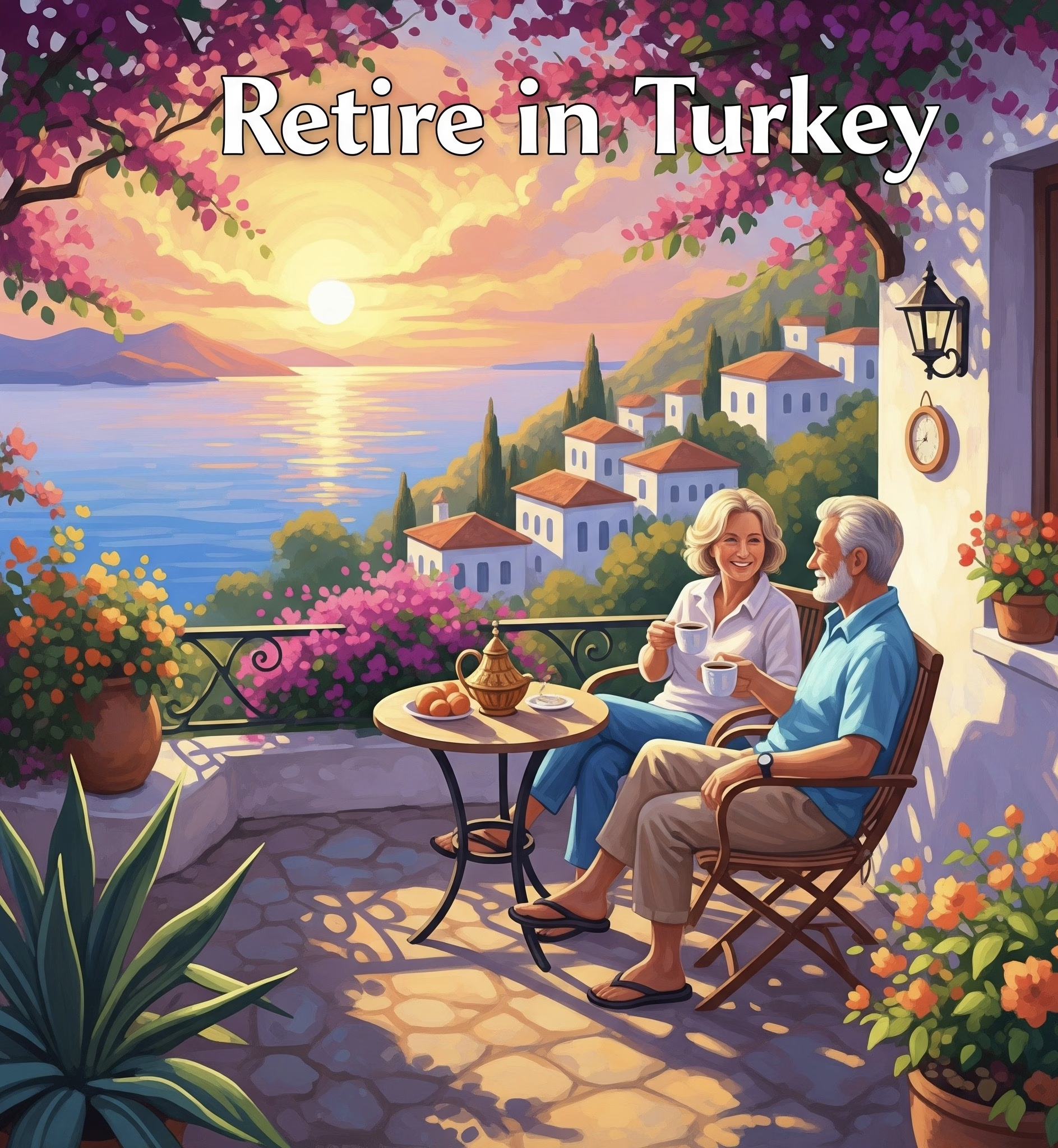
Retire in Turkey
Retire in Turkey: The Joyful, Affordable, Sun-Soaked Second Act You Deserve
So, you’re thinking of hanging up your briefcase, cashing in the pension, and sipping something cold while watching the sun dip into the sea? Excellent choice. And where better to enjoy your golden years than Turkey — a country where history, hospitality, and affordability blend seamlessly under (mostly) clear blue skies.
If you’re looking to retire in Turkey, you’re not alone. Thousands of Europeans and Americans have already discovered what this beautiful and complex country offers: a low cost of living, stunning scenery, and just the right mix of laid-back and lively.
This is your ultimate (and extra long) guide to making it happen — from where to live and how to get your papers in order, to the quirks, joys, and honest truths about retiring in Turkey.

Why Retire in Turkey?
Cost of Living: Champagne Lifestyle, Beer Budget
Let’s start with the big one: affordability. Retiring in Turkey allows you to stretch your pension farther than you ever thought possible. A beachfront apartment in Alanya or a quiet village home in Dalyan can cost less per month than your heating bill back home.
Groceries are cheap, especially if you shop local. Medical costs are laughably low compared to the U.S., and dining out is not a luxury — it’s a way of life.
Sample Monthly Budget for a Retiree Couple in Antalya:
- Rent (furnished apartment): $400–$600
- Utilities & Internet: $60–$100
- Groceries: $200
- Health insurance: $60–$150
- Dining out & leisure: $200–$300
Yes, really.
Climate and Natural Beauty
From the turquoise waters of the Aegean to the snow-capped peaks of the east, Turkey has geography to fit every taste. The Mediterranean coast offers mild winters and endless summers — perfect for morning swims and lazy lunches.
You’ll find microclimates that suit your preferences:
- Hot & Dry: Antalya, Alanya
- Mild & Breezy: Izmir, Bodrum
- Four Seasons: Cappadocia, Bursa
Safety and Healthcare
Turkey is generally a safe country with low violent crime. Healthcare is excellent and affordable, especially in private clinics and hospitals that often have English-speaking doctors. Whether it’s routine checkups or emergency care, you’ll be amazed at the price and service.
Culture and Lifestyle
This isn’t just about retiring. It’s about living. Turkish culture emphasizes hospitality, community, and joy. Don’t be surprised if your neighbors bring you food, your pharmacist gives you unsolicited life advice, or your local barista knows your birthday.
Life here is lived outdoors: markets, cafés, beaches, and walks along the promenade. There’s a sense of belonging — even for foreigners.
Where to Retire in Turkey?
Alanya
The poster child for retirement in Turkey. Affordable, sunny year-round, with a strong international community. Services are tailored for expats, and it’s easy to live without fluent Turkish.
Fethiye
A coastal town that feels more like a lifestyle brand. Picture sailboats, fresh fish, open-air markets, and relaxed beach cafés. It’s peaceful, green, and easy to fall in love with.
Bodrum
Glamorous and artsy, with a hefty dash of seaside charm. More expensive, yes, but still doable. You’ll find cultural events, wine tastings, and a strong European presence.
Izmir
Turkey’s third-largest city — modern, liberal, and less chaotic than Istanbul. Great for retirees who want a city with amenities but without the megacity stress.
Antalya (the broader province)
From the city itself to smaller towns like Side or Kemer, this region has great hospitals, reliable expat infrastructure, and that unbeatable Med coast magic.
Residency and Visas for Retirees
Residence Permit
To retire in Turkey, you’ll need a short-term residence permit, which is renewable annually. Requirements typically include:
- Proof of address (rental contract or property ownership)
- Valid passport
- Health insurance
- Proof of sufficient financial means (bank statement or pension)
Once you’ve been in Turkey for eight consecutive years, you can apply for a long-term residence permit, which doesn’t require annual renewals.
Health Insurance
Private insurance is required when applying for residency unless you’re over 65, in which case you’re exempt. Many retirees eventually enroll in SGK, Turkey’s public health insurance — affordable and accepted at most facilities.
Buying Property in Turkey
Many retirees in Turkey choose to buy property. It’s surprisingly accessible:
- Foreigners can buy in most areas
- You don’t need Turkish citizenship
- The process is relatively quick (often under a month)
Popular property types:
- Apartments in gated complexes (with pools and security)
- Village homes with gardens
- Coastal villas
Prices vary wildly by location. A sea-view apartment in Alanya might cost $70,000–$100,000. A similar property in Bodrum? Easily double.
Owning a property can also help with your residency application.
Cultural Considerations When You Retire in Turkey
Language
You don’t need to be fluent in Turkish, but learning a few basics makes life easier (and more fun). Locals will appreciate it, and it’ll help when you’re negotiating at the market or explaining your power bill issues.
Turkish is phonetic, logical, and full of colorful idioms that are deeply entertaining to learn.
Religion & Traditions
Turkey is mostly Muslim, but extremely diverse in practice. You’ll hear the call to prayer but also find wine shops, bars, and Christmas markets. Respect the culture — especially in smaller towns — and you’ll be respected back.
Social Expectations
Turks love to talk — with neighbors, strangers, the butcher. Retiring here means becoming part of that rhythm. Say hello to your neighbors, accept the tea invitation, and don’t be surprised if someone invites you to their cousin’s wedding within your first month.
The Practical Stuff
Banking
You can open a bank account with a residence permit and tax number. Most major banks offer English-language apps. Many retirees keep some money in EUR/USD accounts due to lira fluctuations.
Taxes
If you stay more than 183 days/year, you’re a tax resident. But many pensions from abroad (especially from EU/US) are tax-exempt in Turkey due to bilateral treaties.
Always check with a local accountant familiar with expat rules.
Moving Belongings
Many retirees ship household items via international movers. But most prefer furnishing their new place locally — Turkish furniture is stylish, affordable, and readily available.
You won’t need much — you’ll be outdoors most of the time anyway.
Tech & Internet
Internet is widely available and quite fast in urban and coastal areas. Many retirees stay in touch with family via WhatsApp, Zoom, and FaceTime.
Local SIM cards are easy to get, though your foreign phone must be registered within 120 days of arrival or it will be blocked.
Community & Lifestyle
Expat Networks
There are thriving expat groups on Facebook, Meetup, and WhatsApp. Many towns have English-language book clubs, game nights, hiking groups, and more.
Staying Active
You don’t retire in Turkey to sit still. Most retirees walk daily, hike in nearby mountains, swim, or take part in yoga or dance classes. Many also volunteer at animal shelters or environmental groups.
Food & Markets
Forget supermarket culture — most retirees embrace the market lifestyle: buying seasonal fruits, chatting with vendors, and developing an emotional relationship with their tomato guy.
Eating out is common and affordable. Turkish breakfast is practically a food group.
Common Questions About Retiring in Turkey
Is my pension safe here?
Yes. You can transfer funds or use international cards. Just keep an eye on exchange rates.
Can I get by without Turkish?
In tourist-heavy areas, yes. But learning some Turkish will enrich your experience tenfold.
Can I bring my pet?
Yes. Turkey is pet-friendly. Just follow the import rules (microchip, vaccinations, paperwork).
Will I be lonely?
Not if you don’t want to be. Most retirees report having more social life in Turkey than back home.
What if I get sick?
You’ll be amazed by the quality and price of private healthcare. No long waits. No insane bills.
Unexpected Joys of Retiring in Turkey
- The call to prayer at sunset
- The kindness of strangers — even when you’re grumpy and lost
- Fresh pomegranates and herbs from the neighbor’s garden
- Becoming a regular at your local café
- Learning to love Turkish soap operas (it happens)
You came for the cost savings. You’ll stay for the life you never imagined was possible.
Final Thoughts: Retire in Turkey and Actually Live
Retirement doesn’t mean slowing down. It means choosing how you want to live — and Turkey offers a life filled with color, flavor, sunshine, and community. Whether you’re a solo adventurer, a couple chasing the sun, or just tired of grey skies and overpriced coffee, Turkey invites you in with open arms and a hot glass of çay.
So go ahead — retire in Turkey.
You’ve earned this.
“Retire in Turkey and enjoy 300 days of sunshine, affordable coastal living, world-class healthcare — and a culture where neighbors still bring you baklava.”
🇹🇷 Retire in Turkey: Why Alanya Is the Ideal Destination for Your Golden Years
✨ Introduction: Why More People Choose to Retire in Turkey
In recent years, thousands of retirees from across Europe, the UK, and beyond have chosen to retire in Turkey, attracted by its year-round sunshine, affordable living, rich culture, and warm hospitality. From the turquoise shores of the Mediterranean to the historic towns of Anatolia, Turkey offers an exceptional quality of life at a fraction of the cost found in Western Europe.
And among all of Turkey’s stunning destinations, Alanya is quickly rising as one of the top places to retire in Turkey— and for good reason.
This comprehensive guide explains why Alanya is ideal for retirees and how you can make the move smoothly, safely, and affordably.
🏖️ What Makes Alanya Perfect for Retirement?
1. Outstanding Mediterranean Climate
One of the main reasons people retire in Turkey — and Alanya specifically — is the climate. Alanya enjoys:
-
Over 300 sunny days per year
-
Mild winters averaging 15–20°C
-
Dry, hot summers cooled by sea breezes
This makes Alanya one of the few places in Europe where you can enjoy outdoor life all year round — whether it’s walking the beach promenade, shopping at local markets, or enjoying your morning tea on a sunlit balcony.
2. Affordable Living on Any Budget
A major reason so many foreigners retire in Turkey is the cost of living — which is significantly lower than in Germany, the UK, or Scandinavia.
In Alanya, your pension stretches further:
| Expense | Estimated Monthly Cost |
|---|---|
| 1-bedroom apartment (center) | €300–€500 |
| Utilities (electric, water, internet) | €80–€120 |
| Groceries (fresh, local produce) | €150–€200 |
| Dining out (2 people) | €10–€25 per meal |
| Private health insurance | €40–€80 |
You can enjoy a comfortable, full lifestyle for under €1,000/month — or even less if you own your property.
3. Real Estate Options for Every Lifestyle
Alanya’s property market is tailor-made for retirees looking to retire in Turkey affordably:
-
Modern apartments with sea views, starting at €60,000
-
Villas in the hills with pools and gardens
-
New developments with elevators, pools, gyms, and security
-
Properties near hospitals, markets, and public transport
Foreigners can legally own property in Turkey (except in certain military zones) and the buying process is well-established, transparent, and quick.
Many retirees choose to buy outright and apply for residency as homeowners.
🏥 Healthcare: Reliable, Modern & Affordable
Turkey’s healthcare system is one of the best in the region, and Alanya is no exception.
Public vs Private Options:
-
Public hospitals are affordable and staffed by competent professionals
-
Private hospitals (e.g., Başkent, Anadolu) offer world-class service at low cost
-
Many doctors speak English, German, or Russian
Expat Health Insurance:
-
Plans start at €40/month for retirees
-
Covers outpatient care, diagnostics, emergencies, and surgery
-
International health insurance is also widely accepted
Being able to retire in Turkey and access excellent healthcare for a fraction of what you’d pay in the West is a major incentive for many.
🌍 A Welcoming Expat Community
Alanya has become a multinational haven, particularly for:
-
Germans
-
Scandinavians
-
Russians
-
Brits
-
Dutch
What this means for retirees:
-
You’re never alone — expat communities are active and supportive
-
English is commonly spoken in shops, clinics, and restaurants
-
There are local expat clubs, Facebook groups, language courses, yoga classes, and more
When you retire in Turkey, especially in Alanya, you’ll quickly find friends and a support network.
🏛️ Residency in Turkey for Retirees
Foreigners looking to retire in Turkey can apply for a renewable residence permit.
Requirements:
-
Valid passport
-
Proof of address (owned or rented)
-
Health insurance
-
Proof of sufficient income (around €500/month per person)
Residence permits are issued for 1–2 years, and can be renewed. Owning property strengthens your application.
Many retirees apply through a local agency in Alanya, making the process easy and stress-free.
✈️ Accessibility: Easy to Arrive, Easy to Stay
Alanya is conveniently served by two airports:
-
Gazipaşa Airport (GZP): Just 30 minutes away
-
Antalya Airport (AYT): ~2 hours, with frequent international flights
This ensures:
-
Family and friends can visit easily
-
You can fly in and out affordably year-round
-
Direct connections to Europe, UK, Middle East
🧘♀️ Lifestyle & Culture in Retirement
Retiring in Turkey doesn’t mean slowing down — it means living well.
Alanya offers retirees:
-
Morning walks along the palm-lined beach
-
Tea and backgammon in local cafés
-
Weekly bazaars full of fresh produce
-
Cultural events, concerts, and art exhibitions
-
Turkish baths (hammam), wellness spas, and dental tourism
-
A culture that respects elders and welcomes foreigners
🛡 Safety and Stability
Despite media misconceptions, Alanya is extremely safe:
-
Low crime rate
-
Friendly, family-oriented society
-
Strong expat protection and integration
-
Well-lit streets, modern infrastructure, reliable transport
Most retirees in Alanya report feeling safer there than in their home cities.
✅ Why Retire in Turkey – and Why Alanya?
In summary, retiring in Turkey, especially in Alanya, offers:
-
A warm, sunny climate year-round
-
Affordable living on a pension
-
Accessible real estate ownership
-
World-class, low-cost healthcare
-
A built-in international community
-
Safe, modern infrastructure
-
Easy residency and travel access
“Retire in Turkey, and every day feels like a vacation — but it’s home.”
Whether you’re already planning or just dreaming, Alanya offers not just a retirement — but a second life, full of discovery, peace, and joy.
“From coast to countryside, retiring in Turkey means choosing comfort, culture, and a cost of living that makes life fuller.”
“Retire in Turkey, where the sunsets are golden, the pace is gentle, and every day feels like a reward.”
“Don’t just retire — rediscover life by the sea, under the sun, in Turkey.”
🌞 Dreaming of warm winters by the Mediterranean?
Thinking about spending your retirement in a sunny, healthy climate?
🏡 Looking to invest in safe, high-potential real estate — and earn solid rental income?
🌍 In today’s uncertain world, having a secure home abroad is more valuable than ever.
At Your Turkey Expert, we work with all major developers across Turkey and offer the widest selection of verified resale apartments and villas — always at the best possible price.
✅ Best Price Guarantee – on every property
✅ No service fee – ever
✅ Full after-sales support – from residence permits to furniture
✅ Honest, expert help – always tailored to your needs
Whether you’re retiring, relocating, or investing — we’re here to guide you every step of the way.
Let us help you find your place in the sun. ☀️
Contact us today – and take the first step toward your new life in Turkey.
🇹🇷 Retire, Invest, or Simply Enjoy Life in Turkey – We’ll Make It Easy
We’ll get back to you quickly — and a solution tailored just for you.

👋 Hi, I’m Urmas Saar. I personally respond to every message and I’ll make sure you get the help or property you’re looking for.
“Looking forward to hearing from you!”
— Urmas, Property Consultant at Expert Turkey
+372 5112 599 (WhatsApp)
